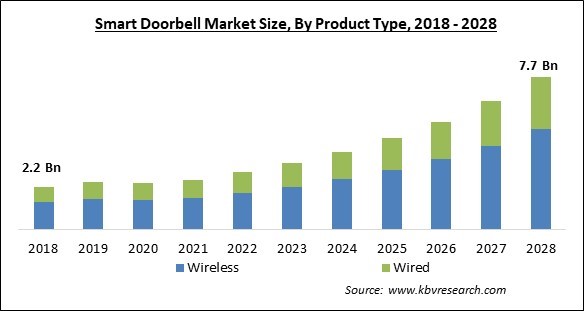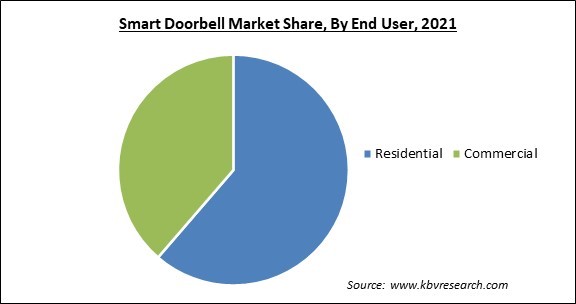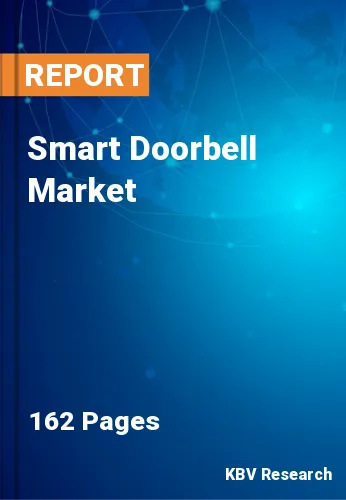The Global Smart Doorbell Market size is expected to reach $7.7 billion by 2028, rising at a market growth of 17.8% CAGR during the forecast period.
A smart doorbell is an internet-connected doorbell that delivers a notification to the homeowner's smartphone or other electronic devices when someone comes to the door. It activates when a visitor hits the doorbell's button, or when the doorbell's built-in motion sensors detect the presence of a visitor. Using the built-in high-definition infrared camera and microphone of the smart doorbell, the homeowner can monitor and chat with the guest using a smartphone app. They come in two varieties viz. battery-operated and wired. Some smart doorbells also have a smart lock that allows the user to unlock the door remotely.

It is a replacement for a standard doorbell that is connected to the internet. It can ring a smartphone along with other devices in the home, and it can connect to a smart home automation system to show live video from the front door. Because most smart doorbells feature video cameras, a smart doorbell is very identical to a video doorbell. Doorbells alert the homeowner of the arrival of a visitor. Smart doorbells go beyond the basics by adding new convenience and security features to the front door.
A motion detector sensor is a device that monitors activity at the door of a house. Sensors play an important role in home control, energy efficiency, computerized lighting control, security, and other supporting frameworks. The sensor examines the windows, entryways, and living room, among other places. It transmits an alarm to the control room whenever it detects any movement. In most families, there is more than one person who can answer the door. The multi-user feature allows both parents and children to access and receive notifications as well as answer the door. With the advancement of Wi-Fi door ring doorbell intercoms, users can now keep the recordings as well, since they now include a built-in SD cardholder. Users can choose from a variety of memory cardholders, such as 16GB or 64GB, based on how much recording they need to save.
The COVID-19 pandemic had a positive as well as a negative impact on the market. As a result of the global lockdowns enforced to stem the spread of COVID-19, people have been confined to their homes. The coronavirus spreads by touching surfaces that are regularly handled. The use of smart doorbells is crucial in preventing the spread of infection. In people's houses, voice-controlled electronic devices help to reduce instances of physical touch. Smart doorbells with video cameras and speakers can also make sure that the customers receive deliveries without having to come into direct touch with the delivery person. On the other hand, the halting of construction activities and delays in construction projects caused by the pandemic are hindering the market growth.
The wireless video doorbell not only allows users to monitor who is at the door, but it also enables them to communicate with them. This is a highly-demanded security measure. When dealing with a stranger, it is highly recommended to figure out what they need prior to opening the door. Users can address visitors at the door whether or not they are at home using the smartphone communications option. If a stranger ring the video doorbell in the absence of the homeowner, they can respond to them remotely without informing them if the homeowner is not at home.
One of the most crucial functions of a doorbell camera is motion detection. A smart doorbell system can notify the user about any kind of movement on their doorstep with a simple push notification. If motion sensors are installed, the user would not need to constantly check their camera recordings. They might also catch local wildlife near the home if they have a motion-sensing camera at the door of their house. Users can also check whether pranksters are playing doorbell ditch before they ring the doorbell.
The wireless/wi-fi network is the only network supported by battery-powered smart doorbells as they do not have an Ethernet connector. Unlike wireless, Ethernet can be superior in some situations. For example, the wireless range is limited to 10-15 meters with batteries, whereas a cable connection can reach 100 meters. Users must pay more money to boost Wi-Fi coverage if the signal is weaker. Wired Ethernet is quicker than wireless/Wi-Fi when compared to wireless.
Based on product type, the smart doorbell market is bifurcated into Wired Doorbell and Wireless Doorbell. In 2021, the wired doorbell segment garnered a significant revenue share of the smart doorbell market. The increasing growth of the segment is attributed to the cost-efficiency of these doorbells. In addition, installing a wired doorbell has various advantages, including low cost, low maintenance, increased security, convenience, and no disturbance. As a result, most people install wired doorbells because they are more convenient.

On the basis of distribution channel, the smart doorbell market is classified into Online and Offline. In 2021, the online segment recorded a substantial revenue share of the smart doorbell market. Online shopping offers a lot of convenience to the buyer as they do not need to move out of their houses to buy products. In addition, online shopping also allows the buyer to experience a wide variety of products from different manufacturers all over the world. Therefore, this factor is driving the growth of this segment of the market.
By end-user, the smart doorbell market is divided into Residential and Commercial. In 2021, the commercial segment witnessed a significant revenue share of the smart doorbell market. A smart doorbell can be utilized in commercial buildings, such as hotels, schools, malls, and other places where employees and visitors require security and safety. The expediting growth of this segment is owing to the increasing concerns about public safety and security.
| Report Attribute | Details |
|---|---|
| Market size value in 2021 | USD 2.5 Billion |
| Market size forecast in 2028 | USD 7.7 Billion |
| Base Year | 2021 |
| Historical Period | 2018 to 2020 |
| Forecast Period | 2022 to 2028 |
| Revenue Growth Rate | CAGR of 17.8% from 2022 to 2028 |
| Number of Pages | 162 |
| Number of Tables | 320 |
| Report coverage | Market Trends, Revenue Estimation and Forecast, Segmentation Analysis, Regional and Country Breakdown, Companies Strategic Developments, Company Profiling |
| Segments covered | Product Type, Distribution Channel, End User, Region |
| Country scope | US, Canada, Mexico, Germany, UK, France, Russia, Spain, Italy, China, Japan, India, South Korea, Singapore, Malaysia, Brazil, Argentina, UAE, Saudi Arabia, South Africa, Nigeria |
| Growth Drivers |
|
| Restraints |
|
Region-wise, the smart doorbell is analyzed across North America, Europe, Asia Pacific and LAMEA. In 2020, North America accounted for the largest revenue share of the smart doorbell market. the growth of the regional market is propelling due to the increased demand from both residential and commercial applications. Moreover, with the rising prevalence of several major market players across this region, the regional population is estimated to witness various new product launches and collaborations.
Free Valuable Insights: Global Smart Doorbell Market size to reach USD 7.7 Billion by 2028
The market research report covers the analysis of key stake holders of the market. Key companies profiled in the report include Amazon.com, Inc., Panasonic Corporation, Google LLC, Arlo Technologies, Inc., Assa Abloy AB, Legrand S.A., Vivint Smart Home, Inc., LaView Eagle-Eye Technology, Inc., Night Owl Security Products LLC, and Skybell Technologies, Inc.
By Type
By Distribution Channel
By End User
By Geography
The global smart doorbell market size is expected to reach $7.7 billion by 2028.
Enhanced Security And Robust Composition are driving the market in coming years, however, Complete Reliability On The Internet limited the growth of the market.
Amazon.com, Inc., Panasonic Corporation, Google LLC, Arlo Technologies, Inc., Assa Abloy AB, Legrand S.A., Vivint Smart Home, Inc., LaView Eagle-Eye Technology, Inc., Night Owl Security Products LLC, and Skybell Technologies, Inc.
The Wireless segment is leading the Global Smart Doorbell Market by Product Type in 2021 thereby, achieving a market value of $5.08 billion by 2028.
The Offline segment shows the high growth rate of 17.4% during the forecast period.
The North America market dominated the Global Smart Doorbell Market by Region in 2021, and would continue to be a dominant market till 2028; thereby, achieving a market value of $2.6 billion by 2028.
Our team of dedicated experts can provide you with attractive expansion opportunities for your business.

